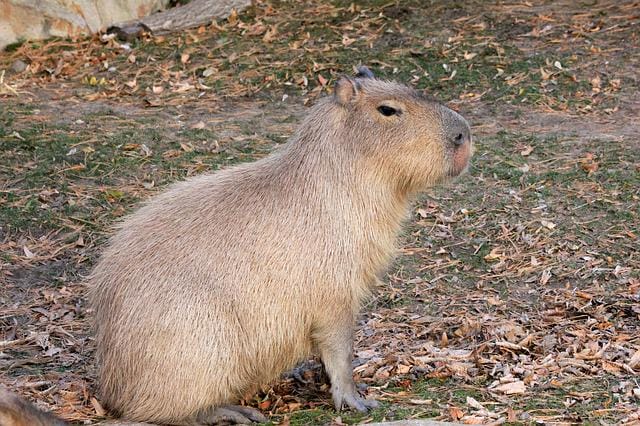
Do capybaras make good pets? This is a question that many people are asking, and the answer is not always clear.
Capybaras are large, semi-aquatic rodents that can weigh up to sixty-five pounds. They are native to South America, but they are becoming increasingly popular as pets in the United States.
In this blog post, we will discuss the pros and cons of owning a capybara so that you can decide if this is the right pet for you!
Capybara’s characteristic
How big do capybaras get?
Capybaras are the largest rodents in the world and can weigh up to 140 pounds!
They typically range from four to seven feet long, with males being larger than females.
What is the lifespan of a capybara?
In captivity, capybaras can live up to 12 years.
In the wild, their lifespan is typically shorter due to predation and disease.
What do capybaras eat?
Capybaras are herbivores and their diet consists mostly of grasses and aquatic plants.
They also enjoy eating fruits, vegetables, and tree bark.
In the wild, capybaras typically eat around 68 different species of plants!
What is the capybara’s health problem?
Capybaras are susceptible to a few different health problems, including diseases like rabies and mange.
They are also at risk for injuries from predators such as jaguars, pumas, and anaconda.

Capybaras as pets
What are capybara’s traits?
Capybaras are social animals and typically live in groups of around 20 individuals.
They are very friendly animals and love to be around people.
However, they can also be quite destructive and need a lot of space to roam.
If you are considering getting a capybara as a pet, make sure you do your research to ensure that it is the right pet for you!
How to take care of the capybara?
If you are considering getting a capybara as a pet, there are a few things you should know about how to take care of them.
They need a lot of space.
A single capybara needs at least a 12×12 foot enclosure, and multiple capybaras need even more space.
They also need access to water at all times, as they are semi-aquatic animals.
If you live in an apartment or small home, a capybara is probably not the right pet for you.
Capybaras are social animals and need to be around other capybaras or they will become stressed.
If you only have room for one capybara, you will need to spend a lot of time with them to make sure they are happy.
Capybaras are destructive animals and will chew on anything they can get their teeth on.
This includes furniture, walls, and even electrical wires.
Make sure you have a lot of chew toys for your capybara to prevent them from destroying your home!
Capybaras are susceptible to a few different health problems.
These include diseases like rabies and mange, as well as injuries from predators.
Make sure you are familiar with these health problems and how to treat them before getting a capybara.
Capybaras are not legal in all states.
Before you get one, make sure it is legal to own a capybara where you live.
Do your research to make sure you are prepared to take care of a capybara before getting one!
Capybaras can make good pets for the right person, but there are a few things you should know about how to take care of them.
Does the capybara need exercises?
Capybaras are semi-aquatic animals and love to live near water sources, so they don’t need a lot of exercise.
However, they do need access to water at all times. If you live in an apartment or small home, a capybara is probably not the right pet for you.

Pros and cons of having capybara as pets
There are a few pros and cons to having capybara as pets.
Pros:
- Capybaras are social animals and typically live in groups of around 20 individuals.
- They are very friendly animals and love to be around people.
- Capybaras are destructive animals and will chew on anything they can get their teeth on.
Cons:
- They need a lot of space. A single capybara needs at least a 12×12 foot enclosure, and multiple capybaras need even more space.
- They also need access to water at all times, as they are semi-aquatic animals.
- Capybaras are susceptible to a few different health problems, including diseases like rabies and mange.
- Capybaras are not legal in all states. Before you get one, make sure it is legal to own a capybara where you live.
How Much Do Capybaras Cost?
The cost of a capybara can vary depending on several factors, including:
- Location: Capybaras are not native to the United States, so they can be more expensive to purchase in areas where they are not readily available.
- Breeder: Reputable breeders who specialize in capybaras will typically charge more than hobby breeders or individuals selling capybaras as pets.
- Age: Baby capybaras are typically more expensive than adults.
- Gender: Females are generally more expensive than males.
- Health: Capybaras that have been health-tested and vaccinated will cost more than those that have not.
In general, you can expect to pay between $1,000 and $3,000 for a capybara. However, some capybaras have been sold for as much as $8,000.
It is important to remember that capybaras are exotic animals with specific needs.
Before you purchase a capybara, it is important to do your research to ensure that you can provide it with the proper care.
This includes having a large enclosure, a swimming pool, and access to a veterinarian who is experienced with exotic animals.
Is it Expensive to Raise Pet Capybaras?
Yes, raising a pet capybara can be significantly more expensive than the initial purchase price. Here’s a breakdown of the various costs involved:
Initial costs
- Purchase price: Ranges from $1,000 to $8,000+, depending on factors like breeder, age, and gender.
- Enclosure: Requires a large outdoor space with a pool, fencing, and shelter. Construction and maintenance can be costly.
- Supplies: Food, bedding, enrichment toys, and other necessities contribute to initial setup costs.
Ongoing costs
- Food: Capybaras are large herbivores with a demanding appetite. Hay, fresh vegetables, and specialized pellets can be expensive.
- Veterinary care: Regular checkups, vaccinations, and potential emergency care for exotic animals can be costly.
- Permits: Some areas require specific permits for owning exotic pets, with associated fees.
- Insurance: Finding pet insurance for exotic animals like capybaras can be challenging and expensive.
- Travel: Taking a capybara on trips or moving requires specialized arrangements and can be expensive.
Additional considerations
- Lifespan: Capybaras can live 7-10 years, requiring a long-term financial commitment.
- Social needs: Capybaras are social animals and thrive in pairs, adding another layer of cost and responsibility.
- Specialized care: Caring for a large, exotic animal requires knowledge and resources not typical for most pets.
Conclusion
Overall, capybaras can make good pets for the right person, but there are a few things you should know about how to take care of them.
Do your research to make sure you are prepared to take care of a capybara before getting one, And make sure to give them a good name that you can find on our capybara names!
Have you ever considered getting a capybara as a pet? Let us know in the comments below!


GIPHY App Key not set. Please check settings